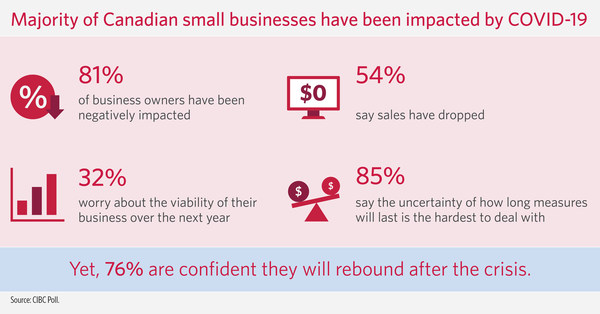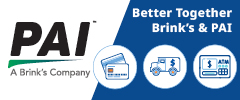
COVID-19 impact felt by 81 per cent of Canadian small business owners: CIBC Poll
Tuesday, May 12, 2020
A new CIBC study finds that the majority (81 per cent) of Canadian small business owners say COVID-19 has negatively impacted their operations, and many (32 per cent) worry about the viability of their business over the next year. However, optimism for the longer term remains strong with most business owners (76 per cent) confident they can rebound after the crisis. The majority (85 per cent) agree the uncertainty of how long COVID-19 measures will last is currently the hardest aspect to manage.
-

CIBC-COVID-19 impact felt by 81 per cent of Canadian small busin
The COVID-19 pandemic has had an unprecedented impact on the Canadian economy. Many business owners (54 per cent) say sales have dropped, and an additional 28 per cent have had to temporarily shut down operations altogether. Most have made significant changes to weather the crisis, including reducing operating expenses (34 per cent), dipping into savings (29 per cent), laying off staff (25 per cent) and applying for more credit (15 per cent). Close to one-in-three (29 per cent) feel it will take a year or two to get back to pre-COVID business volumes.
"It's clear that entrepreneurs still believe in their opportunity to grow over the longer term, but are facing significant issues right now that are leading some to question if they can sustain their business long enough to move into recovery mode," says Laura Dottori-Attanasio, Senior Executive Vice-President and Group Head, Personal and Business Banking, CIBC. "Seeking the right guidance and advice can help businesses restructure their finances to weather the current circumstances, and plan for the future as the situation evolves."
Cash flow and business volumes are major concerns, with half of business owners (52 per cent) citing reduced customer demand for products and services, and one-in-five (21 per cent) concerned they may not be able to pay staff. Owners are searching for ways to improve, with 52 per cent trying to reduce debt levels, 44 per cent looking for more credit to support operating capital and 39 per cent seeking cash management and advice.
A number of businesses may diversify or pivot to endure through the crisis. Many (45 per cent) are seeking ways to use the current environment as an opportunity to meet a new need, however a large number (74 per cent) say their business is not currently equipped to sell or service online.
Business owners should consider three key areas of focus as part of a plan to manage through the near term economic challenges posed by the COVID-19 pandemic:
- Get an accurate picture of your cash position today – identify all potential sources of available cash and sort them into six categories: available operating funds; accounts receivable; locked-in investments; market-linked investments; inventory and other liquid capital, such as a line of credit or the Canada Emergency Business Account. Once you have an accurate picture of your cash position, look at your current obligations — whether that be supplier payments, employee wages, or commercial rent — to evaluate, manage your net cash position and consider if you need additional capital from investors or your bank.
- Forecast your business opportunities in the near term - in an environment where things change quickly, it's important to assess the supply and demand options for your business.
Key things to consider are whether your business can remain open to clients in any way to generate revenue, how much you foresee demand changing as restrictions from various levels of government evolve in the coming weeks and months, and pinpointing changes in customer engagement. Forecasting your revenue generation opportunities over the coming months can give a clearer view of your cash flow forecasts and financing needs.
- Be proactive and get help from a variety of channels – once you've identified cash flow issues in the near term, look at where you can optimize available resources and opportunities for additional funding. The latter could include: deferring payments to suppliers for credit; selling off inventory wholesale; taking advantage of government programs; contacting your advisor or local banking centre to see how your bank can help; and deferring tax payments in line with the Canada Revenue Agency's deferral options. Also consider contacting your bank to discuss options for business client payment deferrals and other support.
For business owners looking to pivot or upskill, opportunities include accelerating digital commerce and interaction capabilities, re-evaluating supply channels to optimize cost, and evolving business models by re-thinking distribution channels or changing billing services.
Other poll findings:
- Of the 26 per cent of business owners who do have online operations, 30 per cent have seen an increase in sales and 25 per cent say they've remained the same compared to pre-COVID-19 levels
- 60 per cent of business owners say they wish they could do more to help their staff
- 78 per cent are thankful for their personal support system during this period
- 51 per cent say they want to use the current crisis to learn a new skill to strengthen their business
CIBC experts share their tips and advice to help business owners manage through the COVID-19 crisis in a new podcast here.



























